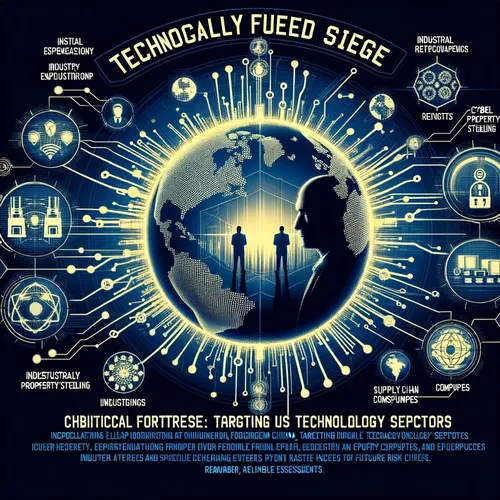Silicon Siege: China's Tech Offensive Has US Scrambling | Nvidia Halts Chips, Apple Lawsuit, Navy Espionage
- Author
- Quiet. Please
- Published
- Sun 24 Aug 2025
- Episode Link
- https://www.spreaker.com/episode/silicon-siege-china-s-tech-offensive-has-us-scrambling-nvidia-halts-chips-apple-lawsuit-navy-espionage--67497597
This is your Silicon Siege: China's Tech Offensive podcast.
New reports out of Silicon Valley this week read like a cyberpunk thriller—except the drama is all too real. Welcome to Silicon Siege, where China’s tech offensive has the US sector scrambling. I’m Ting. Yes, I’m fun at parties, but I also know my way around a firewall and a Ministry of State Security dossier. Buckle up, listeners.
Let’s get straight to what’s been sizzling these past two weeks. On August 22, Nvidia halted production of its China-specific H20 AI chips, a move confirmed by The Information and Reuters. The reason? Pressure from Chinese officials who claim those chips have hidden “backdoors.” Nvidia CEO Jensen Huang has denied that—strongly—but the timing couldn’t be juicier. Just last week, Beijing’s Cyberspace Administration summoned Nvidia to answer for these alleged vulnerabilities, while back in D.C., export controls were tightening, and AMD and Nvidia cut a deal to share 15% of their China chip revenues with the US government in exchange for longer export leashes.
Speaking of espionage, Apple just lobbed a legal missile at OPPO and its US arm, InnoPeak Technology, in California federal court. Their key allegation: a seasoned former Apple Watch engineer named Dr. Chen Shi orchestrated a “premeditated heist,” smuggling proprietary designs, source code, sensor concepts—even secret hardware roadmaps—straight to China using encrypted Mandarin messages and late-night data dumps. Apple alleges coordinated IP theft, not just a wayward employee. The implications? Billions in R&D potentially vaporized and rivals getting jump-started on the next-gen wearable war.
It's not just the mega-brands feeling the heat. A San Diego jury on August 20 convicted two US Navy sailors, Jinchao Wei and Wenheng Zhao, for passing sensitive naval tech and mission data to Chinese handlers posing as research contacts. They weren’t grabbing missile codes; rather, they provided detailed specs, manuals—even F-35 carrier deployment notes—over eighteen months for a few thousand bucks. This wasn’t high drama out of a Bond film, but the operational risk to US defense contractors and the supply chain is massive.
On the AI side, the expert take from sources like Business Insider and AInvest is blunt: China accelerates by stealing or poaching, not just innovating. Over a third of US firms report surging IP theft losses; Meta’s hiring pirates poach top lab engineers. Meanwhile, Chinese companies like DeepSeek are touting homegrown “next-gen AI chips” to undercut US market share and fuel their own industrial leaps. Salaries for AI talent in Beijing and Shenzhen now rival San Jose.
Looking ahead, industry analysts warn the grand game is about R&D lock-in, supply chain resilience, and talent firewalling. Diversify your supplier base. Double down on insider threat training. Trust? Audit it twice. The US-China tech war is so 2025, and the future? Expect more double agents, legal skirmishes, and clever code—on both sides.
Thanks for tuning in to this week’s code red download with Ting. Hit subscribe if you’re ready for your next hack of insight. This has been a quiet please production, for more check out quiet please dot ai.
For more http://www.quietplease.ai
Get the best deals https://amzn.to/3ODvOta
